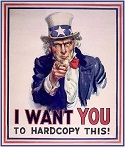|
1870-1900 |
|
|
1870-1900 |
|
|
"Everybody is talkin' these days about . . . graft, but nobody thinks of drawin' the distinction between honest graft and dishonest graft. There's all the difference in the world . . . . I've made a big fortune out of the game, and I'm gettin' richer every day. . . . There's an honest graft, and I'm an example of how it works. I might sum up the whole thing by sayin': 'I seen my opportunities and I took 'em.' "  |
| CONTENT OUTLINE |
currently unavailable. |
| OVAL OFFICE |
|
|
| WHAT 'S MY LINE? |
|
|
|
| PRIMARY SOURCES / DOCUMENTS |
|
 |
| EXTENDED RESPONSE |
| 1. Author Mark Twain referred the era following the Civil War as the "Gilded Age." Discuss why Twain attached this label to the period, and whether it is an appropriate description. 2. "It is in vain to search the Republican and Democratic national platforms between 1862 and 1896 for any clear-cut antithesis on any real issue." Assess the validity of this statement. 3. Identify the dominant political characteristics of the Gilded Age and explain the factors responsible for the decline of the presidency during this period. 4. Evaluate the terms of any two of the following Presidents, citing specific examples to support your conclusions—Ulysses S. Grant; Rutherford B. Hayes; James A. Garfield; Chester Arthur; Grover Cleveland; Benjamin Harrison; William McKinley. 5. Discuss the emergence and decline of the Populist Party. What were the important points of its Omaha Platform of 1892? 6. Trace the need for and evaluate the effects of any two of the following legislative measures enacted during the Gilded Age—Chinese Exclusion Act (1882); Pendleton Act (1883); Interstate Commerce Act (1887); Dawes Severalty Act (1887); Sherman Anti-Trust Act (1890). |
| CHEAT SHEET |
|
| REWIND & FAST FORWARD |